
A token in cryptocurrency is a digital asset that represents a specific right or utility on a blockchain network. It's like a digital coupon that can be used to access a particular service or product.
Tokens are created on top of an existing blockchain, such as Ethereum, using a process called token generation events. This allows developers to create custom tokens that can be used for various purposes.
Tokens can represent a wide range of things, from a company's equity to a loyalty program. They can also be used to access exclusive content, services, or experiences.
In essence, tokens are a way to create a new layer of functionality on top of an existing blockchain network.
What is a Token?
A token in cryptocurrency is essentially a digital asset that represents a specific value or utility on a blockchain network. It's built on a platform like Ethereum, which is a popular choice for many tokens.
Some tokens, like Tether (USDT) and USD Coin (USDC), are stablecoins designed to maintain a price of $1. They're pegged to the U.S. dollar and are built on the Ethereum blockchain.
Tokens can also be used to represent a specific utility or service, like Chainlink (LINK), which is an oracle network that provides real-world data to smart contracts on a blockchain.
The value of a token can fluctuate, as seen with Shiba Inu (SHIB), which became popular in 2021 and saw its price skyrocket. However, its value has since fallen.
Tokens can be used for a variety of purposes, including trading and investing. If you're interested in investing in cryptocurrency, understanding tokens is an important part of the process.
Here are some of the top crypto tokens, including their blockchain platform:
- Tether (USDT) - Ethereum
- USD Coin (USDC) - Ethereum
- Shiba Inu (SHIB) - Ethereum
- Chainlink (LINK) - Ethereum
- Uniswap (UNI) - Ethereum
Types of Tokens
There are several types of tokens that reside on blockchains, including reward, utility, security, governance, and asset tokens.
Reward tokens are used to incentivize users to contribute to the network, while utility tokens provide access to a service or product. Security tokens represent ownership in a company or asset, and governance tokens allow holders to vote on decisions affecting the network. Asset tokens represent ownership in a physical asset, such as a piece of art or a real estate property.
Here's a breakdown of the different types of tokens:
Coin
A coin is a type of digital currency developed with encryption algorithms, functioning as a medium of exchange and virtual bookkeeping. It's a unique representation of its parent blockchain's monetary and technical infrastructure.
Coins issued by a particular blockchain are tailored to it and serve as a representation of its monetary and technical infrastructure. This means that the blockchain's taxes and rewards are all paid in its native currency.
For example, Bitcoin miners are rewarded in bitcoin, which is a legitimate store of value and an alternative to traditional banking. Bitcoin's limited supply of only 21M bitcoins makes it an attractive and reliable store of value.
Some coins have chain-specific applications, such as Ripple's native asset XRP, which serves as the fundamental medium of exchange between financial institutions, payment providers, and crypto exchanges. XRP transactions typically take four seconds and cost just 0.00001 XRP, compared to the standard remittance market where international money transfers can take up to 48 hours.
Coins can be considered a legitimate alternative to traditional banking, as seen with Bitcoin, which has a limited supply of 21M bitcoins. This limited supply makes it an attractive and reliable store of value.
Here's a comparison of some coins and their chain-specific applications:
Altcoins
Altcoins are any cryptocurrencies other than Bitcoin. They're often considered alternatives to Bitcoin, the first cryptocurrency.
The term "altcoin" is used because these cryptocurrencies exist outside of the original Bitcoin framework. This doesn't mean they're inferior, just different.
A good example of an altcoin is Ethereum, which has its own native blockchain and is used for a wide range of applications beyond just being a currency.
Here's a breakdown of the relationship between altcoins, cryptocurrencies, and crypto tokens:
All altcoins are cryptocurrencies, but not all cryptocurrencies are altcoins. This means that altcoins are a subset of cryptocurrencies, but not the other way around.
Token Creation and Storage
Creating a cryptocurrency token can be done by building it on the ERC20, the Ethereum standard for creating fungible tokens. You can find detailed instructions on how to create your own token with ERC20 on the Ethereum Foundation’s official website.
To create a token, you'll need to follow the instructions provided by the Ethereum Foundation. This will ensure that your token is compatible with the Ethereum blockchain and can be easily transferred and traded.
If you're buying tokens from crypto exchanges, they will typically put them in a custodial wallet that they control. If you want to have full control over your tokens, then you’ll have to transfer them to your hot or cold wallet. Different tokens might require different wallets, so be sure to check the list of compatible wallets on the project’s website.
Here are some common types of wallets used to store crypto tokens:
- Hot wallets: These are software wallets that are connected to the internet and can be accessed at any time.
- Cold wallets: These are hardware wallets that are not connected to the internet and provide an additional layer of security.
It's worth noting that some tokens may have specific requirements for storage, so be sure to check the project's website for more information.
How to Store
If you're buying tokens from crypto exchanges, they will typically put them in a custodial wallet that they control. You can transfer them to your hot or cold wallet for full control over your tokens.
Different tokens might require different wallets, so it's best to check the list of compatible wallets on the project's website.
To store your crypto tokens securely, you have two main options: hot wallets and cold wallets. Hot wallets are connected to the internet and can be accessed quickly, but they're also more vulnerable to hacking. Cold wallets, on the other hand, are offline and more secure.
Here's a quick rundown of the two options:
Ultimately, the choice between a hot and cold wallet depends on your personal preference and level of security concern.
How to Create
To create a cryptocurrency token, you can build it on the ERC20, the Ethereum standard for creating fungible tokens. You can find detailed instructions on how to create your own token with ERC20 on the Ethereum Foundation’s official website.
The most popular way to create a cryptocurrency token is through the ERC20 standard. This method is widely used due to its flexibility and ease of use.
ERC20 tokens are fungible, meaning one token is interchangeable with another. This characteristic makes them suitable for a wide range of applications, from digital assets to utility tokens.
Creating a token on the ERC20 standard requires following the instructions provided by the Ethereum Foundation. These instructions are available on their official website, making it easy for anyone to create their own token.
ERC20 tokens can be easily created and managed, making it an ideal choice for developers and project creators.
Token Trading and Swaps
Token trading is pretty straightforward - you can trade tokens on an exchange just like you would coins. To start, find an exchange with an active listing for your desired asset, create an account, and top it up with other coins or tokens.
You can use tools like Bitsgap to trade on up to 15 connected exchanges from a single interface, giving you more flexibility and control over your trades.
Bitsgap also offers advanced trading tools, such as crypto automated trading bots, that can help you make money from trading tokens. These bots follow specific strategies, like the GRID, DCA, BTD, and COMBO bots, which can be used in different market conditions.
Here are some examples of the trading bots available on Bitsgap:
Token swaps, on the other hand, allow you to exchange one token for another without converting to fiat currency. There are different types of token swaps, including regular token swaps, cross-chain swaps, and token migrations.
How to Trade
To trade cryptocurrency tokens, you'll need to find an exchange that lists your desired asset and create an account. You can then top it up with other coins or tokens.
You can use an exchange like Bitsgap, which allows you to trade on up to 15 connected exchanges from a single interface. This can make it easier to manage your trades and keep track of your assets.
One way to make trading easier is to use a crypto automated trading bot. Bitsgap offers a few different bots that can automatically trade crypto for you, following a predetermined set of rules.
The GRID bot, for example, follows the GRID strategy, which works best in the swing market where the price bounces within a horizontal range. The DCA bot, on the other hand, follows the Dollar Cost Averaging strategy, which involves dividing your investment into periodic purchases or sales of tokens in small amounts.
The BTD bot follows the Buy The Dip trading strategy, which works best in a downtrend market where the token's price steadily falls. By buying up tokens at a discounted price, the bot can help you build a token portfolio.
Here are some of the trading bots offered by Bitsgap, along with a brief description of how they work:
- The GRID bot follows the GRID strategy, which works with postponed limit buy and sell orders.
- The DCA bot follows the Dollar Cost Averaging strategy, which involves dividing your investment into periodic purchases or sales of tokens.
- The BTD bot follows the Buy The Dip trading strategy, which works best in a downtrend market.
- The COMBO bot combines the DCA and GRID trading strategies and works in the futures market.
Swaps
Swaps are a fundamental part of token trading. There are at least three main kinds of token swaps.
Token swaps can be as simple as exchanging tokens on a centralized or decentralized exchange. Regular token swaps are the most common type of swap.
Cross-chain swaps involve moving your tokens to another blockchain. This type of swap is necessary when you want to trade tokens on a different blockchain.
Token migration is a type of swap that involves transferring a project from one blockchain network to another. This can be done for crowdfunding, improving functionality, or other reasons.
Token Differences and Purpose
Security tokens and cryptocurrencies are often confused with each other, but they have a crucial difference in purpose and intended use. A cryptocurrency is designed to be used as currency, money, or payment method.
Cryptocurrencies like Bitcoin and Ethereum were not created to be used as investment instruments, but investors have treated them as security tokens because of their increasing value. This is not their intended purpose.
The primary purpose of a security token is to record ownership of an underlying asset on a blockchain. This allows investors to access investment opportunities in regulated markets.
Security tokens are not the same as e-cash, which is a digital asset created for the sole purpose of exchanging hands as payment. A security token, on the other hand, is an electronic illustration of a traditional venture asset like a share of stock or bond.
Tokens can represent an investor's stake in a company or serve an economic purpose, similar to legal tender, but they are not legal tender themselves. Token holders can use them to make purchases or trades to make a profit.
Crypto tokens are built on an existing blockchain, whereas crypto coins have their own independent blockchain. Crypto coins are designed to be used as currency, while crypto tokens are intended to represent an interest in an asset and facilitate transactions on a blockchain.
Frequently Asked Questions
Is Ethereum a coin or a token?
Ethereum is a token, not a coin, as it runs on its own blockchain, the Ethereum blockchain. This distinction is crucial in understanding the fundamental differences between Ethereum and other cryptocurrencies.
Sources
- https://bitsgap.com/blog/cryptocurrency-tokens-explained-how-are-they-different-from-coins
- https://www.investopedia.com/terms/s/security-token.asp
- https://www.wallarm.com/what/whats-a-security-token-in-crypto
- https://www.investopedia.com/terms/c/crypto-token.asp
- https://www.fool.com/terms/c/crypto-tokens/
Featured Images: pexels.com


